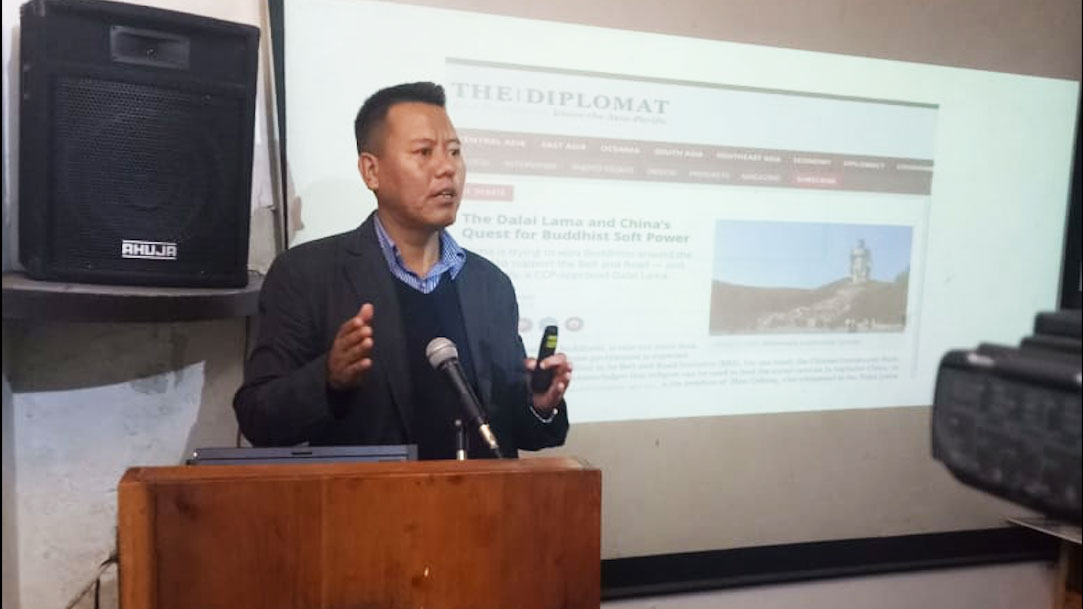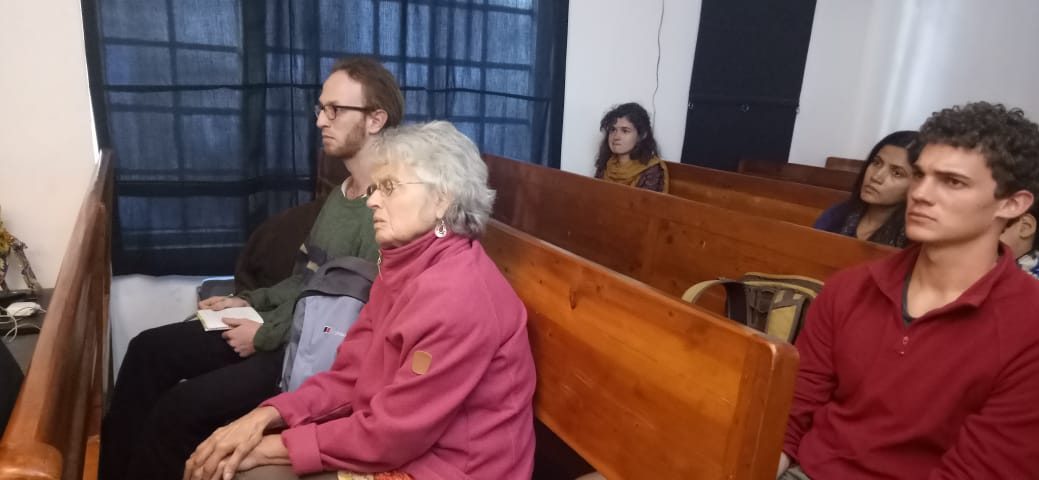The Tibet Museum Tibet Awareness Talk series: “Strategic Interests of China Pursuing the Buddhist Soft Power” by Dr. Rinzin Dorjee


McLeod Ganj, Dharamsala: The Tibet Museum hold Bi-monthly Tibet Awareness Talk Series held on 7th November 2018. The speaker, Dr. Rinzin Dorjee, a research fellow of the Tibet Policy Institute gave a talk on “Strategic Interests of China Pursuing the Buddhist Soft Power.” The speaker has Master in Political Science from Madras Christian College, M.Phil in South and South-East Asian studies from the University of Madras and earned PhD in Department of Politics and Public Administration of same university. He researches on the “Impacts of China’s Infrastructure development in Tibet at the Tibet Policy Institute.
He started his presentation with a quote of Mao Zedong said to His Holiness the 14th Dalai Lama during the latter’s visit to China in 1954, “religion is poison. It has two major defects: it undermines the race, and secondly, it retards the progress of the country. Tibet and Mongolia have been both poisoned by it.”
He revealed the changed of China’s policy on religion under the present leadership which contradicts the Mao’s quote on religion. The speaker further mentioned that the Chinese government in recent time has funded heavily in building Buddhist institutes in China. Tibetan Buddhism has been embraced and controlled to meet the party’s interests. There have been rapid increase in the number of Chinese youngsters and even well-established businesspersons growing interest in Tibetan Buddhism and seeks teachings from Tibetan Buddhist masters. The Chinese government even allowed Chinese and Tibetans to practice the religion if they support and doesn’t go against the Chinese Communist Party. The speaker cited an example of a high Chinese official, Xiao Wunan who invited Tibetan Lama in his luxurious apartment in Beijing to give the teaching and his activities abroad in engaging Buddhist countries.
The speaker also questioned, “If Buddhism is China’s soft power, does China really has the moral authority or the historical authority to claim the Buddhist soft power?” China in last one decade invested millions of Yuan to establish various Buddhist institutions in China. The Nanhai Buddhism Academy’ in Hainan province of China, opened in 2017, touted as China’s version of Nalanda University is one such example. The institution enrolled around 270 students to teach Buddhism in different languages including Tibetan.
The speaker later dealt that according to him China doesn’t have the moral authority to claim the Buddhist leadership or to use Buddhism as the soft power. He justified his statement by saying, till date Buddhism is originally kept intact for many centuries by the Tibetan Buddhists as it has the largest number of Tibetan Buddhist texts translated from Sanskrit and Pali. Tibetan Buddhism traces back its origin to the Buddha himself through the lineage tree in Tibetan Buddhism. For example, the Karma Kagyu School of Tibetan Buddhism, Tibetan Buddhist master, Milarepa had received teaching from Indian masters like Naropa whose teacher, Tilopa traces their relationship to Nagarjuna and others Indian masters of Nalanda University. On the other hand, Buddhism couldn’t survived in China due to many political factors. The Chinese communist party and its government being an atheist and Cultural Revolution had destroyed all the religion in China. As a result, the Chinese government doesn’t have historical authority and legitimacy to claim the leadership of Buddhist world.
Dr Rinzin also shed light on the Chinese government strategy to use the Buddhist soft power to engage Buddhist countries in South and South-East Asian countries. When the current President of China, Xi Jinping, launched the Belt and Road Initiative in 2013, China found use of Buddhist soft power to engage countries like Bangladesh, Sri Lanka and Nepal. Through this, China utilized the Buddhist soft power to have a soft landing and to receive cooperation on the BRI project. The speaker also highlighted China’s investment of 3 $ billion in Nepal for Lumbini project through Asia Pacific Exchange and Cooperation Foundation (APECF), quasi-governmental organization of China. With the fund from the Chinese government, Pakistan, a non-Buddhist country, observed the International Day of Vesak.
At the end of presentation, the speaker concluded the talk by highlighting the grim situation of Tibetan Buddhism in Tibet under restricted Chinese rules. He questioned the audience that, If China is really interested in the protection and promotion of Tibetan Buddhism, why they destroyed the half of the Lha-rung Ghar Buddhist monastery in Tibet in 2016? The satellite image of China’s destruction of Lha-rung Ghar site is depicted in his presentation.
Contrarily, the Chinese Government is interfering in centuries old Tibetan Buddhist tradition of reincarnation system. He highlighted that Tibetan Buddhist reincarnated lamas in Tibet have to seek approval of the Chinese government.
The speaker concluded his talk with a note that, like the two 11th Panchen Lamas, one recognized by the His Holiness the 14th Dalai Lama and another appointed by the communist party of China but failed to receive respect from Tibetans in Tibet. He speculated that, we might see the situation of two 15th Dalai Lamas in future. China using the Buddhist soft power to engage Buddhist countries in the world will seek respect for their appointed 15th Dalai Lama.
~Reported by Kunga Choedon

